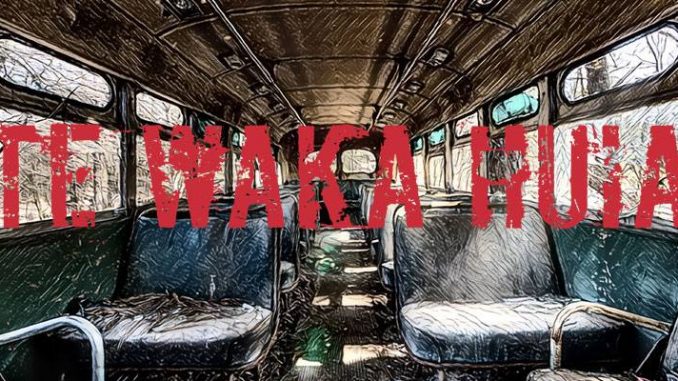
[History Lesion]
Excavating history for the purposes of storytelling is a tricky business; a balancing act between telling the truth while being respectful to the real people. The 1963 Brynderwyn bus accident is a particularly sensitive subject, being both from our shores and the not-so-distant past.
Playwright (and supporting actor) Naomi Bartley cleverly sidesteps direct commentary on the accident by setting it in the modern day, planting it as the backdrop of a high school classmates Emily (Amanda Grace Leo) and Jack (Matiu Kerema) as they hang out around the remains of the bus. Their teenage dynamic is performed with realism and ease, playing genuine affection, romantic potential and platonic admiration with a careful balance, making it a joy to watch the relationship unfold. Kerema conveys the journey between boyish ignorance and growing up effortlessly, while Leo’s character, with her harsher edges and heavier personal baggage, is balanced with palpable eagerness and sensitivity.
While dramatic flashbacks to the crash feel mostly unnecessary, and demonstrate a lack of confidence in the central narrative, they hint at the relationship between our country’s past and present, and the way they’re inextricably bound. Homage to this is more successfully paid through the character of Pahi (Junior Misimoa), a seemingly homeless Māori man with a direct connection to the bus. Dialogues between him and the victims’ ghosts are played with measured ambiguity, evoking equal memory and grief, and Misimoa handles the characterisation with careful humour and warmth, ensuring he doesn’t lapse into a dangerous stereotype.
Director Chris Molloy manages the material carefully, jumping from moments of playful theatricality to thoughtful stillness. The set, represented in a deconstructed version of the bus, is both practical and heavily symbolic. For the characters of Te Waka Huia, the remains become an eroded Cherry Orchard, full of misplaced memories and an unstable constant. But, most importantly, the bus, and whether or not it is removed by the council, provides a dramatic thrust to the story. The questions central to the play isn’t what happened, but what will happen.
While the play’s many narrative strands are left open-ended, the ending is suffused with a hopeful quality, giving the story an optimistic ambiguity rather than bleak dissatisfaction. Lacking the rich details of a history lesson, Te Waka Huia uses the tragedy as a vehicle to excavate history and loss in a gentle and considerate fashion. The accident is seen and discussed with enough distance to avoid recklessly reopening old wounds, though it is unlikely to provide catharsis either.
Te Waka Huia plays at The Basement as part of the Matariki Festival until 7 July.




Leave a Reply